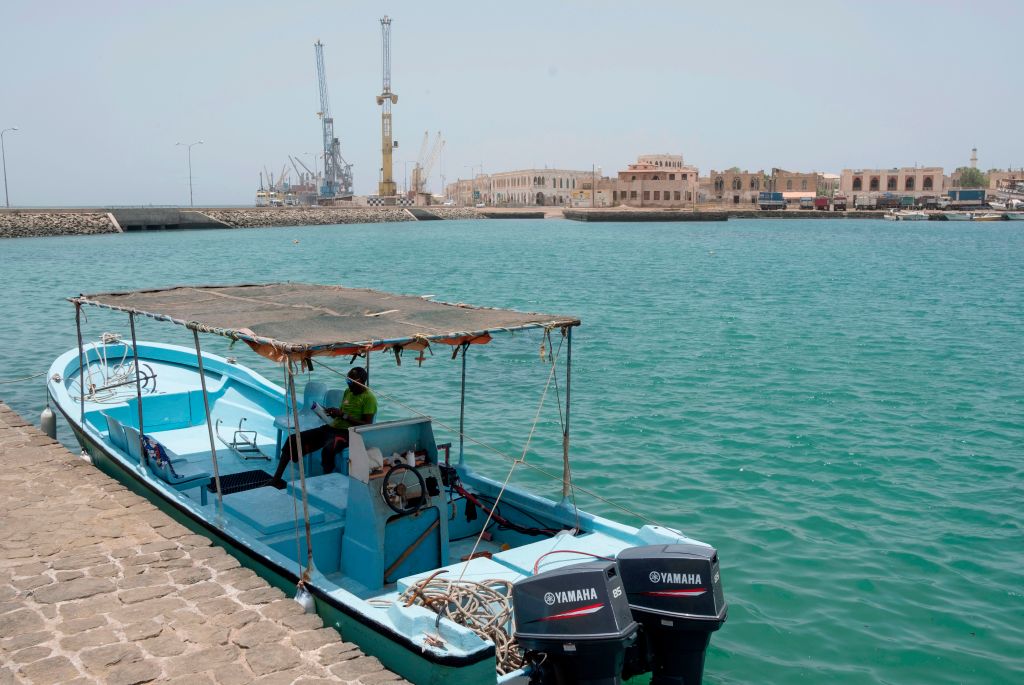ADF STAFF
Sometimes called a hermit state, Eritrea is one of the most diplomatically isolated countries in the world. A history of repression, human rights abuses and conflict with neighboring countries has left it with few allies on the world stage. But its 1,150 kilometers of coastline on the Red Sea mean it continues to attract interest from abroad.
“Asmara punches above its weight in geopolitical significance because of where it sits,” wrote Joshua Meservey, a senior fellow who studies Africa at the Hudson Institute. “It holds a commanding position on the Bab el-Mandeb Strait, a global shipping chokepoint, and its islands pepper the Red Sea approach to the strait.”
Over the last year, Eritrea has tightened economic, diplomatic and military ties with China and Russia. Both countries hope to expand their military footprint in the Horn of Africa and, despite official denials, Eritrea appears open to hosting a foreign base.
From 2015 to 2021, Eritrea granted permission to the United Arab Emirates to fly aircraft from a coastal airstrip and dock vessels at a port in the city of Assab during the UAE’s engagement in Yemen. It may be willing offer similar accommodations to China or Russia.
Meservey believes “alarm bells should be ringing” at the possibility of a foreign military buildup on the coast that could threaten global shipping. “If China develops a base — or possibly even dual-use infrastructure — in Assab or Massawa to complement its base in neighboring Djibouti, it would be able to blockade the Bab el-Mandeb Strait.”
Courtship from China
In May, Eritrean President Isaias Afwerki visited China where, during a banquet at the nation’s Great Hall of the People, President Xi Jinping touted the two countries’ “deep bond of friendship in an uncertain and unstable world.”
Isaias has ties to China dating to 1967 when he received military training in the country and learned guerilla warfare tactics used by Mao Zedong.
In 2021, Eritrea signed on to join China’s Belt and Road Initiative and has reportedly seen a steep increase in Chinese construction projects in 2023. Over the last 11 years Chinese companies bought controlling stakes in all four of Eritrea’s developed mining projects for minerals including copper, zinc and potash.
China already operates its first overseas military base in neighboring Djibouti, where it built underground bunkers, hardened infrastructure and a pier capable of accommodating an aircraft carrier. But Meservey said that does not eliminate the possibility of China expanding to Eritrea.
“It would look different. But my sense is that it would have to be sufficient to give them supremacy over the Bab el-Mandeb Strait and the approaches to it,” Meservey told ADF. “Because I don’t see the strategic rationale in putting something in Eritrea if it didn’t assert or create primacy over that chokepoint.”
Russian Ties
Isaias has visited Russia twice in 2023 and, during a roundtable event with Russian President Vladimir Putin, he urged Russia to lead the way in creating what he termed a “new world order.” Eritrea has been a loyal supporter of Putin and was the only African country to vote against a U.N. resolution denouncing Russia’s invasion of Ukraine in 2022.
Russia has longed for a permanent Red Sea military presence and was in talks with Sudan’s junta to establish a base in Port Sudan before Sudan became embroiled in a civil war. There are signs it may now be turning its attention toward Eritrea.
Eritrea’s port city of Massawa signed a memorandum of understanding with Russia’s Sevastopol naval base on the Black Sea pledging closer ties. In a January visit by Russian Foreign Minister Sergei Lavrov, the first of its kind, Lavrov praised the “logistical potential” of Eritrea’s port and airport in Massawa.
“I think Eritrea would be a logical second choice for the Russians,” Meservey said. “Potentially they will shift their energy and focus to Eritrea if it looks like Port Sudan is not going to work out for them. There’s been serious high level diplomatic engagements.”
Russia has signed more than 24 cooperation agreements in Africa in recent years, marking a significant increase from previous decades, according to an analysis by the Africa Center for Strategic Studies.
‘Cunning Manipulator’
Isaias has held an iron grip on power for more than 30 years without ever running for election or facing a serious challenge to his rule. In an essay for “Democracy in Africa,” researchers Faisal Ali and Mohamed Kheir Omer marveled at his longevity over the decades as he fought wars with neighbors, sent arms to rebel groups and silenced dissidents.
“Isaias is a cunning manipulator and determined survivor,” Ali and Omer wrote. “He emerged as the grand older man of East African politics.”
Meservey said the tightening ties with Russia and China are a “natural progression” of Isaias’ strategy and world outlook that stresses self-reliance and mistrust of the global order and international institutions. He may believe the time is right for him to increase his profile globally. However, Meservey cautions that China and Russia have a history of empowering and emboldening some of the most oppressive regimes in Africa.
“These two countries have a long history of supporting violent, authoritarian regimes. That leads to immense instability and also grave human rights violations,” Meservey said. “So as China and Russia build their influence in places like Eritrea, I think that’s a win, unfortunately, for violent and authoritarian regimes.”

